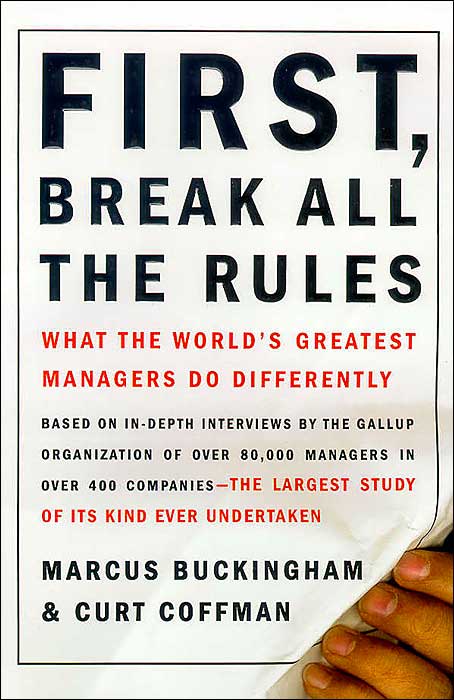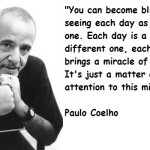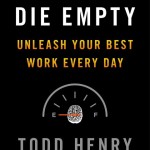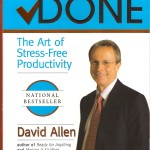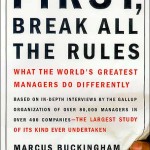First, Break All the Rules, subtitled What the World’s Greatest Managers Do Differently (1999), is a book authored by Marcus Buckingham and Curt Coffman, who offer solutions to better employee satisfaction with the help of examples of how the best managers handle employees. The book appeared on the New York Times bestseller list for 93 weeks.
Business authors Marcus Buckingham and Curt Coffman discuss the fallacies of standard management thinking and how good managers create and sustain employee satisfaction. The book is a result of observations based on 80,000 interviews with managers as conducted by the Gallup Organization in the last 25 years. The core of the matter lies in how these managers havedebunked old myths about management and how they created new truths on obtaining and keeping talented people in theirorganization. Some key ideas of the book include what the best managers do and don’t do: they treat every employee as an individual; they don’t try to fix weaknesses, but instead focus on strengths and talent; and they find ways to measure, count, and reward outcomes. [From: Wikipedia.com]
“Many of us feel stress and get overwhelmed not because we’re taking on too much, but because we’re taking on too little of what really strengthens us.”
The greatest managers in the world seem to have little in common. They differ in sex, age, and race. They employ vastly different styles and focus on different goals. Yet despite their differences, great managers share one common trait: They do not hesitate to break virtually every rule held sacred by conventional wisdom. They do not believe that, with enough training, a person can achieve anything he sets his mind to. They do not try to help people overcome their weaknesses. They consistently disregard the golden rule. And, yes, they even play favorites. This amazing book explains why.
Marcus Buckingham and Curt Coffman of the Gallup Organization present the remarkable findings of their massive in-depth study of great managers across a wide variety of situations. Some were in leadership positions. Others were front-line supervisors. Some were in Fortune 500 companies; others were key players in small, entrepreneurial companies. Whatever their situations, the managers who ultimately became the focus of Gallup’s research were invariably those who excelled at turning each employee’s talent into performance.
In today’s tight labor markets, companies compete to find and keep the best employees, using pay, benefits, promotions, and training. But these well-intentioned efforts often miss the mark. The front-line manager is the key to attracting and retaining talented employees. No matter how generous its pay or how renowned its training, the company that lacks great front-line managers will suffer.
Buckingham and Coffman explain how the best managers select an employee for talent rather than for skills or experience; how they set expectations for him or her — they define the right outcomes rather than the right steps; how they motivate people — they build on each person’s unique strengths rather than trying to fix his weaknesses; and, finally, how great managers develop people — they find the right fit for each person, not the next rung on the ladder. And perhaps most important, this research — which initially generated thousands of different survey questions on the subject of employee opinion — finally produced the twelve simple questions that work to distinguish the strongest departments of a company from all the rest. This book is the first to present this essential measuring stick and to prove the link between employee opinions and productivity, profit, customer satisfaction, and the rate of turnover.
“When you feel as though you can’t do something, the simple antidote is action: Begin doing it. Start the process, even if it’s just a simple step, and don’t stop at the beginning.”
There are vital performance and career lessons here for managers at every level, and, best of all, the book shows you how to apply them to your own situation.
[From: Amazon.com]
Many business books begin by articulating a set of all-encompassing rules that the reader is expected to internalize in order to become successful in his or her profession. Marcus Buckingham and Curt Coffman take a radically different approach in this bestselling guide to improving managerial performance. Instead of having us squeeze ourselves into prefabricated roles, the authors encourage us to develop individual styles based on our own innate talents and competencies — and they back up their recommendations with data gathered during the course of more than 80,000 interviews with managers in almost every conceivable industry. What are some of the rules they encourage people to break? One of the most controversial is the time-honored notion that all people should be treated equally, a mandate that perhaps arises from the belief that parents shouldn’t show special favor to some of their children. Instead, Buckingham and Coffman encourage leaders to devote attention to those employees who are truly talented and committed to moving the business forward. The authors don’t advocate sacrificing discipline or training, but they do offer innovative ways to reconceptualize the work we do while increasing the pleasure we get from the doing of it. [From: Barnesandnoble.com]
If you like this story, CLICK HERE to join the tribe of success-minded people just like you. You will love our weekly quick summaries of top stories, talks, books, movies, music and more with handy downloadable guides, cheat sheets, cliffs notes and quote books.
